Search Results: representation
There are more than 200 results, only the first 200 are displayed here.
-
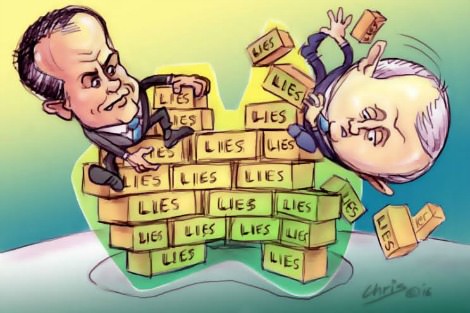
AUSTRALIA
- Justin Glyn
- 11 April 2016
10 Comments
We got a lesson in the art of language from the Minister of Immigration, Peter Dutton, whose redefinition of the word 'detention' was reminiscent of Humpty Dumpty's remark in Alice Through the Looking Glass: 'When I use a word it means just what I choose it to mean, neither more nor less.' We are social creatures who make real decisions based on the representations of others. Once we know we cannot expect the truth from each other, especially those who govern, society can no longer function.
READ MORE 
-

AUSTRALIA
- Ellena Savage
- 18 March 2016
24 Comments
'Coming out' is a gesture specifically, politically required of queer people but not of straight people. Another statement demanded of queer people is that they are injured and traumatised by the fact of their sexuality or gender. But why call on individuals to testify when the statistics are heartbreaking enough? This demand on queers to continually deliver narratives of oppression limits their social roles, and even invalidates their voices on matters other than their sexualities and genders.
READ MORE 
-

RELIGION
- Andrew Hamilton
- 25 February 2016
23 Comments
Liberation theology was once caricatured as Marxism with a Christian tinge, or the Bible plus Kalashnikov. In fact, thinkers identified with the movement were involved in a serious theological exploration. In public conversation in Australia the theological questions ut it raised are of marginal significance. But secular variants abound in which society is analysed in terms of the discrimination suffered by various minority groups at the hands of the majority or of those with power.
READ MORE 
-
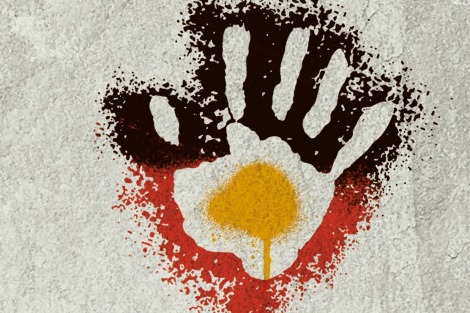
AUSTRALIA
- Frank Brennan
- 15 January 2016
9 Comments
It is now more than three years (and three prime ministers) since the expert panel set up by the Gillard government reported on how the Constitution might be amended to provide recognition of Aboriginal and Torres Strait Islander peoples. When I read the report, my heart sank. It had put forward a comprehensive, but unachievable and unworkable proposal for change. The lesson from 1967 is that a modest change carried overwhelmingly by the Australian people provides the impetus for change.
READ MORE 
-
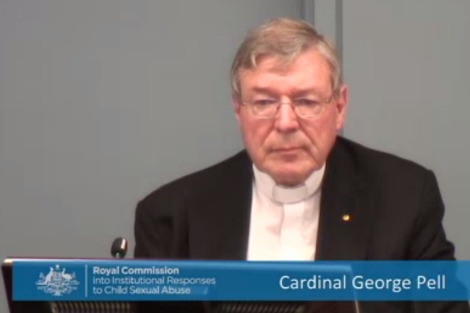
RELIGION
- Frank Brennan
- 24 November 2015
46 Comments
Last week the Herald Sun reported: 'Victims of child sexual abuse look set to be grilled by lawyers for Pell in a bid to quash explosive allegations he was complicit in a widespread cover-up.' As the Royal Commission into Institutional Responses to Child Sexual Abuse recommences its case study on the Catholic Church in Ballarat, it's only fair Pell have his lawyers cross examine these victims. His reputation is on the line and the commission has spared no effort in scrutinising his past actions.
READ MORE 
-

AUSTRALIA
- Frank Brennan
- 19 October 2015
7 Comments
It is now more than three years (and three prime ministers) since the expert panel set up by the Gillard government reported on how the Constitution might be amended to provide recognition of Aboriginal and Torres Strait Islander peoples. When I read the report, my heart sank. It had put forward a comprehensive, but unachievable and unworkable proposal for change. The lesson from 1967 is that a modest change carried overwhelmingly by the Australian people provides the impetus for change.
READ MORE 
-

ECONOMICS
- David James
- 19 October 2015
7 Comments
For those who believe, as G. K. Chesterton quipped, that the popular press is 'a conspiracy of a very few millionaires', the decline of mainstream media may not seem such a great loss. But the thinning of journalistic ranks is not good for democracy. In the world of business, old habits usually do not die at all — it is rather the businesses themselves that experience terminal decline. What journalism that does emerge from the ashes of the existing mainstream media businesses will be very different.
READ MORE 
-

AUSTRALIA
- Frank Brennan
- 16 October 2015
2 Comments
I acknowledge those Aborigines and Torres Strait Islanders who insist that they have never ceded their sovereignty to the rest of us. I join with those Aborigines and Torres Strait Islanders who hope for better days when they are recognised in the Australian Constitution. As an advocate for modest constitutional recognition for Indigenous Australians, I respect those Aborigines and Torres Strait Islanders who question the utility of such recognition. But I do take heart from President Obama's line in his Charleston eulogy for the late Reverend Clementa C. Pinckney: 'Justice grows out of recognition'.
READ MORE
-

- Jenny Te Paa
- 09 October 2015
16 Comments
Thank you Francis, for although you have not spoken at any length about theological education per se — any more than you have spoken about the status of women per se — in spite of these somewhat startling omissions, this indigenous lay woman theological educator feels no less inspired, comforted, reassured, blessed, beyond imagining by your gentle, wise, insistent and prophetic urgings.
READ MORE
-

- Frank Brennan
- 18 September 2015
Pope Francis's concerns are not narrowly dogmatic or pedagogical but universally pastoral. He knows that millions of people, including erstwhile Catholics, are now suspicious of or not helped by notions of tradition, authority, ritual and community when it comes to their own spiritual growth which is now more individual and eclectic. He wants to step beyond the Church's perceived lack of authenticity and its moral focus on individual matters, more often than not, sexual. He thinks the world is in a mess particularly with the state of the planet — climate change, loss of biodiversity and water shortages, but also with the oppression of the poor whose life basics are not assured by the operation of the free market, and with the clutter and violence of lives which are cheated the opportunity for interior peace. He is going to great pains to demystify his office. He wants all people of good will to emulate him and to be both joyful and troubled as they wrestle with the probl
READ MORE
-
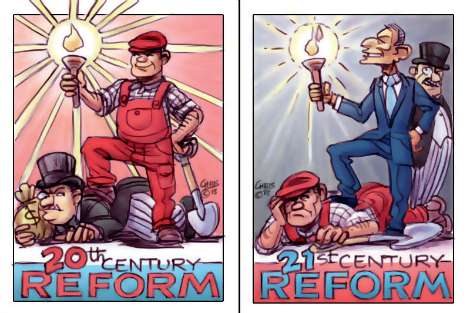
AUSTRALIA
- Jeff Sparrow
- 08 September 2015
5 Comments
The recent National Reform Summit was lauded as an attempt to 'rediscover the art of reform that in the past generation helped to drive high living standards and made Australia the envy among smart nations'. Yet the urgency with which Australian pundits demand 'reform' corresponds with a peculiar opacity about what the term actually means, with its past association with the socialist movement but more recent appropriation as a neoliberal mantra.
READ MORE 
-
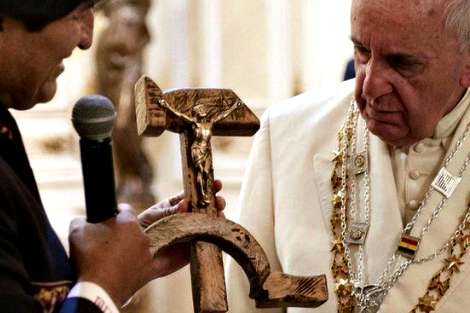
AUSTRALIA
- Andrew Hamilton
- 16 July 2015
17 Comments
The media declared Pope Francis not amused after Bolivian President Morales presented him with a crucifix superimposed on a hammer and sickle. It turned out that the design was from Jesuit Luís Espinal, who was captured, tortured and killed by right-wing paramilitaries in 1980. It depicted Christ's affinity with workers and peasants. Pope Francis was more interested in the reality of a crucified people than in discussing representations of the crucified Jesus.
READ MORE 